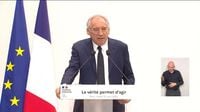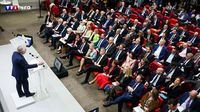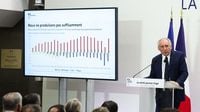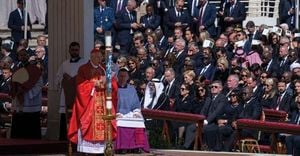On April 15, 2025, French Prime Minister François Bayrou addressed the nation regarding the country’s urgent financial situation, emphasizing the need for significant budgetary reforms. The government has announced the necessity to find an additional 40 billion euros without increasing taxes for the middle class, aiming to meet a deficit target of 4.6% by 2026. This announcement comes amidst growing concerns about the rapid increase of national debt, which Bayrou described as a "dangerous, potentially irreversible trap."
During a press conference following a meeting of the "Budget Alert Committee" held at Matignon, Bayrou expressed that the current debt trajectory is unsustainable, warning that it could reach 100 billion euros by 2029, up from 67 billion in 2025. He characterized the situation as one of the most challenging the country has faced, stating, "There has not often been such a difficult situation for our country."
Bayrou's remarks were met with skepticism from various labor leaders and political figures. François Hommeril, president of the CFE-CGC, criticized the meeting as a "communication operation," claiming it offered no new insights into how the government plans to reverse the economic downturn. He remarked, "We learned nothing about the government's means and ambition to truly turn the economy around."
Marylise Léon, secretary general of the CFDT, argued that the government’s approach is overly focused on accounting measures, stating, "You cannot create a budget solely with an Excel spreadsheet. There is a social justice issue that must be addressed in the development of Budget 2026." She emphasized the need for shared sacrifices among all citizens.
Sophie Binet, leader of the CGT, echoed these sentiments, expressing her concern that the government is fostering an atmosphere of anxiety and urging employees to make sacrifices without adequately addressing the root causes of the financial crisis. "The government has a taboo: it refuses to increase taxes on the wealthy," she stated.
In response to the criticism, Bayrou insisted that increasing taxes is an "untenable solution," arguing that France already has one of the highest rates of compulsory levies in the world. He explained, "If the state has no money in its coffers, simply raising taxes is a simplistic reasoning, but it is untenable."
Amélie de Montchalin, the Minister of Public Accounts, outlined the government’s plan to reduce public spending by 6% by 2029 without resorting to drastic measures. She noted that if immediate action is not taken, the deficit could rise to 5.7% by the end of the year, highlighting the urgency of the situation. "If we do not mobilize today, the deficit could reach alarming levels," she warned.
Despite the bleak outlook, Bayrou remains optimistic about the potential for economic recovery, stating that the country must produce more to finance its social model. He lamented that France's productivity per capita is significantly lower than that of its European neighbors, which he believes contributes to the ongoing financial struggles. "If our production per capita were on par with that of our European neighbors, we would not have a budget deficit," he asserted.
In a bid to engage citizens in the budgetary process, Bayrou announced a commitment to present the "broad guidelines" and "major choices" for the 2026 budget before July 14, 2025. This timeline is intended to allow for public consultation and input, as he seeks to foster a sense of co-responsibility among the French people regarding fiscal policies.
Bayrou's announcement has sparked a range of reactions from political leaders. Marine Le Pen, deputy of the National Rally, criticized his handling of the financial crisis, stating that he has not been "up to the mark" in addressing the severe public finance issues facing the country. She emphasized the need for concrete proposals for structural savings, particularly in areas such as immigration and wasteful spending by the European Commission.
As the government grapples with these financial challenges, it faces mounting pressure from various stakeholders, including local officials and business leaders. The Association of French Mayors has expressed dissatisfaction with the government's communication strategy, claiming that local officials were summoned to the meeting without proper preparation or agenda.
Looking ahead, the government’s approach to the budget will be closely scrutinized as it attempts to balance fiscal responsibility with social equity. Bayrou's commitment to transparency and public engagement will be pivotal in shaping the future of France's economic policy. "We must act with resolution while respecting our social model and our decentralized Republic," he concluded, underscoring the delicate balance the government must maintain in its budgetary decisions.









